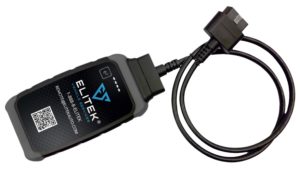
Federal judge refuses to dismiss Repairify’s patent infringement suit against LKQ, Elitek
By onLegal | Technology
A federal judge has rejected a motion by LKQ subsidiary Keystone Automotive Industries and its Elitek Vehicle Services to dismiss a patent infringement lawsuit brought against Keystone by Repairify.
The suit, filed on Aug. 9, 2021 in the U.S. District Court for the Western District of Texas, alleges that Keystone is infringing on three of Repairify’s patents for its system and method for remotely servicing and programming a vehicle through its OBD or OBD II interface. Keystone has denied the allegations.
The suit seeks unspecified damages, and an order enjoining LKQ from making, using, selling, and/or offering for sale Elitek’s EVS Plug-in Device and Remote Service.
US District Judge Alan D. Albright rejected Keystone’s Dec. 6, 2021 motion to dismiss, disagreeing with Keystone’s contention that Repairify had failed to make a plausible claim of direct or indirect patent infringement.
Albright said that Repairify had met the minimum standard, “that a complaint contain sufficient factual matter, if accepted as true, to ‘state a relief that is plausible on its face.'”
“In resolving a motion to dismiss for failure to state a claim, the question is not ‘whether [the plaintiff] will ultimately prevail, … but whether [the] complaint was sufficient to cross the federal court’s threshhold,'” the judge wrote, citing precedent.
In its complaint, Repairify alleges that Keystone violated three of its patents by offering a scan device that can “scan and program a vehicle as if the scan tool was located proximate to the vehicle.” This could only be done, Repairify said, through its patented technology that “in essence inserts the diagnostic tool as a node in the vehicle’s diagnostic data bus.”
Keystone said Repairfy had offered no facts showing that the Elitek “vehicle communication device and the remote communication device continuously communicate so as to enable the scan tool to scan and program a vehicle as if the tool was located proximate to the vehicle.”
Albright said he was satisfied by Repairfy’s presentation of “information available in the public domain,” including images of the interior of the Elitek device, and “images and descriptions of Elitek’s available products and services taken from Elitek’s Remote Services Webpage, identifying where certain features of the Asserted Claims are found in the accused products and service.”
“These allegations more than meet the requirements for pleading patent infringement, especially when the Complaint is viewed as a whole,” the judge wrote.
In its motion, Keystone said Repairify had merely accused it of offering technology that operates “as the prior art allegedly did,” pointing out that two other patented systems “have a local device connected to a vehicle and a remote device that ‘interrogates’ the vehicle and then shuttles messages back and forth with the local device over the internet.”
Generally, prior art is a concept in patent law used to determine whether an invention is novel enough, or non-obvious enough, to be patentable.
Repairify said its patents differed from the prior art because they covered “continuous bi-directional communication” that allows scans and programming to be carried out from a remote location.
“The Court finds that the Complaint sufficiently alleges facts giving rise to a plausible inference of direct infringement,” Albright wrote. “Under [Federal Rules of Civil Procedure] Rule (12)(6), a plaintiff need only allege facts giving rise to a plausible inference and fair notice of infringement by identifying the accused products and alleging that the accused products meet ‘each and every element of at least one claim’ of the asserted patents. The Court is convinced that Repairify meets that standard.”
A motion to dismiss, the judge said, is not the proper place to argue the two parties’ differing interpretations of “continuous connection” and “as if it were proximate to” language that are central to the case.
In a July 20 answer to the original complaint, Keystone denies all of the allegations made against it, and argues that Repairify’s patents – No. 8,688,313, No. 9,684,500, and No. 10,528,334 – are unenforceable because of “material misrepresentations” made in the application process.
These misrepresentations, Keystone alleges, were “made with the specific intent to deceive the PTO [United States Patent and Trademark Office]. But for material misrepresentations, the PTO would not have issued” the first of the three patents. Keystone claims that the second and third patents rely on the first.
Keystone argues that after the PTO rejected the initial patent application, citing two other previous patents, an attorney for Repairify made misleading statements about those patents, leading the PTO to change its mind.
The claims of the ‘313 patent are substantially similar to the claims of the ‘500 and ‘334 patents essentially claiming the same invention. Hence, the claims of the ‘500 and ‘334 patents also have an immediate and necessary relationship to the inequitable conduct that occurred during the prosecution of the ‘313 patent,” Keystone said. “Therefore, the inequitable conduct that occurred during the prosecution of the ‘313 patent also infects and renders the claims of the ‘500 and ‘334 patents unenforceable.”
Albright has set a trial date of June 5, 2023.
More information
LKQ subsidiary Elitek to offer remote scans, programming to auto body shops
Images
Featured image: LKQ subsidary Elitek’s EVS OBD-II plug-in. The device allows Elitek to conduct remote diagnostics on a vehicle within a body shop. (Provided by Elitek)
